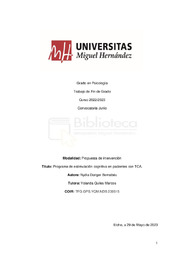Por favor, use este identificador para citar o enlazar este ítem:
https://hdl.handle.net/11000/30136Registro completo de metadatos
| Campo DC | Valor | Lengua/Idioma |
|---|---|---|
| dc.contributor.advisor | QUILES, YOLANDA | - |
| dc.contributor.author | Danger Bernabéu, Nydia | - |
| dc.contributor.other | Departamentos de la UMH::Psicología de la Salud | es_ES |
| dc.date.accessioned | 2023-11-13T16:24:03Z | - |
| dc.date.available | 2023-11-13T16:24:03Z | - |
| dc.date.created | 2023-06 | - |
| dc.identifier.uri | https://hdl.handle.net/11000/30136 | - |
| dc.description.abstract | Los Trastornos de la Conducta Alimentaria (TCA) son una de las enfermedades que más afectan a la población joven, con graves consecuencias, entre ellas deficiencias en el funcionamiento cognitivo que se manifiestan con rigidez cognitiva y/o una coherencia central débil. Estas dificultades a nivel cognitivo han sido identificadas como mantenedores del TCA. El objetivo de este estudio fue diseñar un programa de intervención de estimulación cognitiva basado en la Terapia de Remediación Cognitiva (TRC) (Tchanturia y Hambrook, 2010). Esta intervención es complementaria a los tratamientos habituales y busca estimular cognitivamente a las participantes mediante tareas cognitivas y conductuales, así como aporta estrategias que pueden aplicar también en la vida cotidiana. Esta propuesta de intervención incluye nueve sesiones de entre 45 minutos y una hora, que se realizarán dos veces por semana. Los contenidos de estas sesiones son: psicoeducación sobre las deficiencias cognitivas y la TRC, resolución de problemas, entrenamiento de las funciones ejecutivas, de la memoria de trabajo, de los procesos psicológicos básicos, de la flexibilidad cognitiva y de la coherencia central y actividades de modelado. Para la evaluación de este programa se han utilizado los siguientes cuestionarios: el Inventario de Trastornos de la Conducta Alimentaria (EDI-2), la Escala de Perfeccionismo Multidimensional (MPS) el Inventario de Obsesiones y Compulsiones Revisado (OCI-R), el test CAMBIOS y la tarea de Navón. | es_ES |
| dc.description.abstract | Eating Disorders (ED) are one of the diseases that most affect the young population, being in most cases of chronic course and generating numerous consequences, including deficiencies in cognitive functioning manifested by cognitive rigidity and/or weak central coherence. These difficulties at the cognitive level have been identified as maintainers of ED. The objective of this program was to design a cognitive stimulation intervention program based on Cognitive Remediation Therapy (CRT) (Tchanturia & Hambrook, 2010). This intervention is complementary to the usual treatments and seeks to cognitively stimulate the participants through cognitive and behavioral tasks, as well as providing strategies that can also be applied in daily life. This intervention proposal includes nine sessions between 45 minutes and one hour, to be held twice a week. These sessions contents are: psychoeducation on cognitive impairments and CRT, problem solving, training of executive functions, working memory, basic psychological processes, cognitive flexibility and central coherence, and modeling activities. The following questionnaires were used for the evaluation of this program: the Eating Disorders Inventory (EDI-2), the Multidimensional Perfectionism Scale (MPS), the Obsessions and Compulsions Inventory-Revised (OCI-R), the CAMBIOS test and the Navon task. | es_ES |
| dc.format | application/pdf | es_ES |
| dc.format.extent | 30 | es_ES |
| dc.language.iso | spa | es_ES |
| dc.publisher | Universidad Miguel Hernández de Elche | es_ES |
| dc.rights | info:eu-repo/semantics/openAccess | es_ES |
| dc.rights.uri | http://creativecommons.org/licenses/by-nc-nd/4.0/ | * |
| dc.subject | propuesta de intervención | es_ES |
| dc.subject | trastornos alimentarios | es_ES |
| dc.subject | terapia remediación cognitiva | es_ES |
| dc.subject | estimulación cognitiva | es_ES |
| dc.subject | coherencia central | es_ES |
| dc.subject | intervention proposal | es_ES |
| dc.subject | eating disorders | es_ES |
| dc.subject | cognitive remediation therapy | es_ES |
| dc.subject | cognitive stimulation | es_ES |
| dc.subject | central coherence | es_ES |
| dc.subject.other | CDU::1 - Filosofía y psicología::159.9 - Psicología | es_ES |
| dc.title | Programa de estimulación cognitiva en pacientes con TCA | es_ES |
| dc.type | info:eu-repo/semantics/bachelorThesis | es_ES |

Ver/Abrir:
TFG. Nydia Danger Bernabéu.pdf
1,38 MB
Adobe PDF
Compartir:
 La licencia se describe como: Atribución-NonComercial-NoDerivada 4.0 Internacional.
La licencia se describe como: Atribución-NonComercial-NoDerivada 4.0 Internacional.
Herramientas de Administrador
.png)